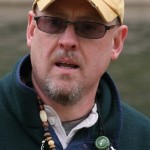by Eugene Peterson
When Israel went out from Egypt,
the house of Jacob from a people of strange language,
Judah became his sanctuary,
Israel his dominion.
The sea looked and fled;
Jordan turned back.
The mountains skipped like rams,
the hills like lambs.
What ails you, O sea, that you flee?
O Jordan, that you turn back?
O mountains, that you skip like rams?
O hills, like lambs?
Tremble, O earth, at the presence of the Lord,
at the presence of the God of Jacob,
who turns the rock into a pool of water,
the flint into a spring of water.
(Psalm 114 ESV)
The most striking thing about Psalm 114 is its imagery: the sea fleeing and Jordan running away, the mountains and hills skipping like rams and lambs, the rock and flint gushing streams of water. This is prayer that is immersed in an awareness of the creation, at home in the earth, sensitive to the life of the nonhuman aspects of the environment.
On second look, it turns out that the prayer is not about nature, but about history: an event — the Exodus from Egypt — is being prayed. On further examination, we find that there are, in fact, no ‘nature’ psalms — psalms about or addressed to nature — in Scripture.
There are psalms in which our experience with and know edge of sky and sea, animals and birds are used in the vocabulary of prayer, but it is always something about God, not creation, that is being prayed. Psalmists praise his act of creation (33); express awe at his incredible condescension in in including humans in a responsible position (8); juxtapose the twin glories of sky and law to reveal God’s design (19); marvel at the scheme of providence so impressively worked out in the intricate interrelations of light, wind, cloud, oceans, springs, birds, fish, storks, badgers, people at work, and people at praise (104). But the psalms are never about nature; always they are about God.
The biblical poets did not go in for “nature appreciation.” In fact, they were vehemently opposed to it. Their opposition was quite deliberate, for the Hebrews’ neighbors all prayed to nature. The most prominent aspects of nature are fecundity and destruction: the hidden processes of birth in earth and womb on the one hand, and on the other hand, the terrible forces of volcano, earthquake, and storm that are quite beyond any prediction or control. The Canaanites (all the surrounding nations in the extrabiblical world were much the same) were in awe of and prayed to this divinity that was beyond them. It is easy to see why they did it, for in unguarded moments we do it still. It is not easy to account for why the Hebrew chose another style of worship.
The created world around us is wondrous. Any moment that we attend to it, feelings and thoughts that seem very much like prayer. These are so spontaneous and uncontrived, so authentic and unpretentious, that there is little doubt that we are in some deep communion with a reality beyond us, with gods — or God. Compared to our experience in the scheduled hours of worship at established places of prayer, these sometimes seem more genuine, which accounts perhaps for the frequently voiced preferences for sunsets on the beach over eighteenth-century hymns in chapel.
Eugene H. Petersonis a pastor, scholar, author, and poet. He has written over thirty books, including Gold Medallion Book Award winner The Message: The Bible in Contemporary Language(Navpress Publishing Group, 2002), a contemporary paraphrase of the Bible. This excerpt appeared in The Best Preaching on Earth edited by Stan L. LeQuire and published by Judson Press in collaboration with the Evangelical Environmental Network in 1996. This is the first of a four part series on the theme of Creation in the Psalms.










